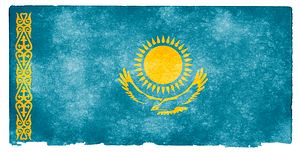Two months after renouncing public activism in what critics viewed as a coerced recantation, Olesya Khalabuzar plead guilty to inciting ethnic hatred in an Almay court. She was sentenced to two years of restricted freedom and told RFE/RL she did not intend to appeal the sentence.
When asked by a reporter from RFE/RL’s Kazakh service, Azattyq, why she had not sought independent counsel to defender herself, Khalabuzar responded that it would be “useless.”
Khalabuzar, once on the leading edge of political activist in Kazakhstan, has experienced a decided fall from grace. In 2015, Joanna Lillis profiled Khalabuzar for EurasiaNet. Seated below a poster of “ the formidable, blindfolded figure of Lady Justice” Khalabuzar said of the movement she was founding, “It’s very simple…The party’s goal is to attain justice. Legal justice, social justice and, naturally, justice in defending human rights.”
The party — Adildik in Kazakh, Spravedlivost in Russian, Justice in English — was small and unregistered; Khalabuzar positioned it in 2015 as a grassroots movement but eschewed calling for deep reforms of Kazakhstan’s political system. That moderation seems to have not mattered.
In March, police raided the Justice party’s offices, Khalabuzar’s apartment, and her mother’s home. At the time, Azattyq reported that the searches were prompted by a criminal case filed by an unnamed citizen (A.A.) who alleged a violation of the law on illegal organizations. The week prior, Khalabuzar had been detained and questioned for nine hours over her involvement in orchestrating opposition to proposed constitutional changes — specifically those focused on land rights.
Land rights are a sensitive issue in Kazakhstan. In spring 2016, rumors about pending changes to the land code sparked some of the largest public protests Kazakhstan has seen in its 26 years of independence. Initially citizens were inflamed over false rumors that the land code changes would allow foreigners (i.e. Chinese) to buy up Kazakh land; but the protests became a catalyst for the airing of other grievances, many brought to the fore by difficult economic times.
According to Azattyq, the crux of the Article 174 incitement charges against Khalabuzar was the production of leaflets with what the authorities viewed as inflammatory language regarding the threat that Kazakh lands would be seized by the Chinese if changes to Article 26 of the constitution were adopted.
Kazakhstan, a major hub on Beijing’s modern reimagining of the old Silk Road, is notably sensitive to public expressions of anti-Chinese sentiment. In a recent report, the International Crisis Group identified anti-Chinese sentiment as a challenges to China’s Belt and Road Initiative in Central Asia. Such sentiment is, in part, stratified by class. A Chinese scholar put it like this to Crisis Group’s researchers: “most of the people in Central Asia who have strong negative sentiments against China are not powerful, while those who have power want to work with China.”
Article 174 of the Kazakh criminal code outlaws actions aimed at inciting “social, national, generic, racial, class or religious hatred” as well as the “insult of the national honour and dignity or religious feelings of citizens” and “propaganda of exclusivity, superiority or inferiority of citizens on grounds of their relation to religion, class, national, generic or racial assignment.”
As I’ve written previously — like when a 46-year old Aktobe resident was given three years in prison for insulting Putin in 2016, and earlier this year when a 60-year-old Jehovah’s Witness was given five years after an Article 174 conviction — the law is about as vague as possible. That vagueness, and the flexibility it provides, means anyone can be charged with for just about anything.
Back in 2015, Khalabuzar told EurasiaNet that people in Kazakhstan were “beaten down, feeling like nobody and nothing in this country, and feeling absolutely deprived of rights… Until we change from slaves into masters … we will not be able to demand our rights.”
































